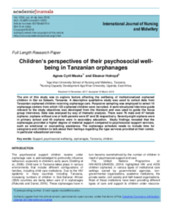Displaying 241 - 250 of 525
With the support community and academic partners, a school-based health center administered by a Federally Qualified Health Center developed a plan for outreach, systematic screening and referral to services for newcomer youth.
The study consisted of a comparative follow-up study with a pretest-posttest design which explored the association between baseline child, family, and care characteristics and the psychosocial development of 121 schoolaged Dutch children during their first year of placement in foster care (FC), family-style group care (FGC), and residential care (RC).
The current study implemented a concurrent, parallel mixed methods research design, whereby quantitative (survey) and qualitative (focus groups) data were collected simultaneously to explore: (a) the frequency of posttraumatic stress disorder, depression, suicidal ideation, and substance use, (b) trauma exposure at pre-migration, migration, and post-migration, and (c) how youth may cope with these adversities.
This study assesses psychological well-being, risk, and resilience of youth currently in-care and former foster youth and how preparation for independent living affects these factors.
The aim of this study was to explore factors affecting the wellbeing of institutionalized orphaned children in Dar es Salaam, Tanzania.
This study aims to observe the effect of structured education provided to improve self-esteem and hope on the self-esteem and the suicide probability of male adolescents living in orphanages.
This study examines a program (iHeLP) for substance use reduction in foster youth aging out of care.
The present study is aimed at evaluating changes of foster care adolescents' self-efficacy and psychological functioning during the solution-focused self-efficacy enhancement group intervention for adolescents.
This cross-sectional descriptive study explores the behavioral and emotional problems in institutionalized children in India.
This blog post from Child Trends presents findings from an evaluation of three models of trauma-informed care in the US child welfare system.

